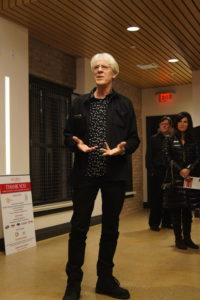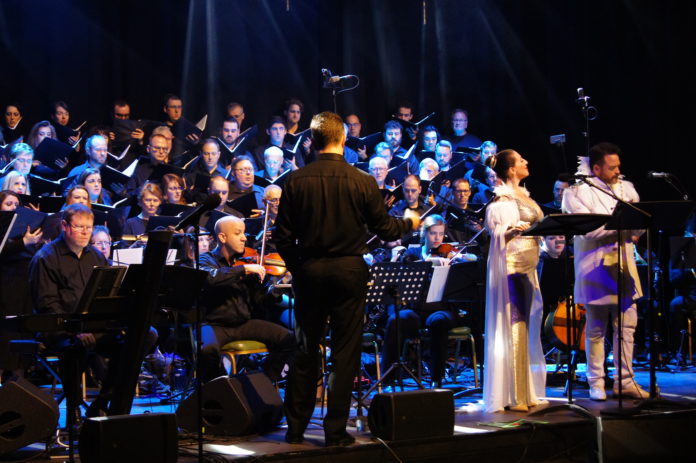By Jamie Wiggan
Music Review: Stewart Copeland returned to Pittsburgh this month to premiere “Satan’s Fall” — an ambitious choral work that straddles the boundaries of opera, classical and heavy metal. The former rock icon and choral director Matthew Mehaffey spoke to Local Pittsburgh about the creative process and how music adds an extra dimension to the narrative.

Worlds apart from the groove-infused punk rock that propelled him to stardom in the 1980s, former Police drummer Stewart Copeland grapples with cosmic themes in his latest composition – Satan’s Fall – which premiered at the newly-renovated Roxian Theatre in McKees Rocks Feb. 7.
Drawing on text from 17th-century epic poem “Paradise Lost,” “Satan’s Fall” recreates the eruption of evil into our once-perfect universe as Satan is cast out of heaven. The piece premiered in back-to-back performances by the Mendelssohn Choir of Pittsburgh on Feb. 7-8 and is set for further renditions by a slate of international choirs.
For 35 minutes, 80 voices sang 1500 words of Elizabethan English into an arresting drama.
“It’s a totally unique piece that’s been created in Pittsburgh,” said the choir’s musical director, Matthew Mehaffey. “The way that [Copeland] uses the choir is truly unique… The sound is really at the intersection between heavy metal, opera and classical.”
Mehaffey commissioned Copeland to work on the score after the two were introduced during Copeland’s last trip to Pittsburgh in 2016. That time, he was premiering a percussive concerto with the Pittsburgh Symphony Orchestra.
“We approached Stewart because of his cross-over appeal with contemporary rock and opera,” Mehaffey said.
While Copeland was still working on the score, Mehaffey flew to California to work in elements from his chorister’s palette. Later, Copeland came to Pittsburgh to workshop the piece with a stripped-down choir, including soloists Nathan Granner and Jamie Chamberlin.

For Copeland, Milton’s tale of cosmic warfare serves both as an ideal theme for an “aggressive” oratorio and as a gripping – although unsatisfactory – solution to the philosophical problem of evil.
“I’ve always wondered… why is there an adversary? Why is there evil across the land if there’s a loving God?” Copeland said during an interview. “In the 17th century [English Puritan John Milton] attempted to explain that. I don’t think he provided a very useful explanation, but he sure did provide some powerful language.”
Embedding that language in music adds a further dimension of power and helps the listener enter deeper into the drama, Copeland explained.
“Music can negate what your eyes are telling you, in fact, it has more impact on you than facts and information,” he said. “Music tells you how to feel about that information, which determines your behavior much more than facts.”

Since The Police disbanded in 1985, Copeland has wound his way through a less than predictable career composing ballets, operas and Hollywood film scores. Public appearances behind the kit playing in rock and jazz super-groups (as well as a 2007 Police reunion tour) have since been relatively scarce.
Still, his percussive instincts bleed into the composition, according to Mehaffey.
“[Copeland’s] background as a drummer shows in his interest in rhythm and texture,” Mehaffey said. “[The piece incorporates] some really challenging rhythms that are not typically something that choirs do.”
It also matches Copeland’s earlier musical ventures in terms of energy.
“It’s about the constant war between the forces of righteousness and the forces of evil, and so it’s gonna be loud,” Copeland said before the show.
Mehaffey said he and his team chose McKees Rocks’ newly-remodeled Roxian Theatre after surveying a number of area venues, accounting for size, acoustics and aesthetics.
“We’re happy to be here in this beautiful new venue in McKees Rocks,” Mehaffey said before introducing the choir on the opening night.
Representatives of Roxian Live – the team that owns and operates the venue – said the performance demonstrated the theatre’s suitability for hosting musical styles other than mainstream rock and pop.
“[Satan’s Fall] showcased the Roxian’s versatility as a venue for all types of music,” said John Sieminski, a partner. “We were honored that the choir chose our venue for this incredibly important event and we now know what we had hoped was true – The Roxian Theatre is a world-class performance and entertainment space.”
For Pittsburgh natives Ryan McClain and Craig Glasgow, the premiere of “Satan’s Fall” marked the fulfillment of a lifetime’s ambition.
“After 23 years in the making, we have finally met all [three] members of The Police,” McClain said.
Their pilgrimage began in 1997 when they met guitarist Andy Summers at the former Graffiti Showcase Cafe in Oakland. A few years later, they met Sting in New York, before capping it off last week at a meet-and-greet with Stewart Copeland on the Roxian’s exclusive upper balcony.
“We saved the best till last.”












